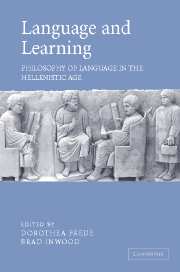Book contents
- Frontmatter
- Contents
- List of contributors
- Preface
- List of abbreviations
- Introduction
- 1 The Stoics on the origin of language and the foundations of etymology
- 2 Stoic linguistics, Plato's Cratylus, and Augustine's De dialectica
- 3 Epicurus and his predecessors on the origin of language
- 4 Lucretius on what language is not
- 5 Communicating Cynicism: Diogenes' gangsta rap
- 6 Common sense: concepts, definition and meaning in and out of the Stoa
- 7 Varro's anti-analogist
- 8 The Stoics on fallacies of equivocation
- 9 What is a disjunction?
- 10 Theories of language in the Hellenistic age and in the twelfth and thirteenth centuries
- References
- Index nominum et rerum
- Index locorum
10 - Theories of language in the Hellenistic age and in the twelfth and thirteenth centuries
Published online by Cambridge University Press: 23 November 2009
- Frontmatter
- Contents
- List of contributors
- Preface
- List of abbreviations
- Introduction
- 1 The Stoics on the origin of language and the foundations of etymology
- 2 Stoic linguistics, Plato's Cratylus, and Augustine's De dialectica
- 3 Epicurus and his predecessors on the origin of language
- 4 Lucretius on what language is not
- 5 Communicating Cynicism: Diogenes' gangsta rap
- 6 Common sense: concepts, definition and meaning in and out of the Stoa
- 7 Varro's anti-analogist
- 8 The Stoics on fallacies of equivocation
- 9 What is a disjunction?
- 10 Theories of language in the Hellenistic age and in the twelfth and thirteenth centuries
- References
- Index nominum et rerum
- Index locorum
Summary
In Western Europe during the twelfth and thirteenth centuries, interesting theories concerning various aspects of language were prolific. In intellectual energy, these centuries could compete with those of Plato, Aristotle, Theophrastus, Epicurus and Chrysippus. One might add the first half of the fourteenth century, but I shall leave it out of account, mainly because the new developments in semantics (due to Burley, Ockham, Buridan and others) were accompanied by an astonishing loss of interest in grammar.
In trying to compare and connect some pieces of scholastic theory with Hellenistic theory I use a totally conventional limitation of the Hellenistic age to the years between 323 bc and 31 bc. I take it for granted, though, that linguistic doctrine attested in Quintilian and/or Sextus Empiricus is almost invariably of Hellenistic origin.
At the beginning of the twenty-first century we do not possess a single major work on linguistic issues from the time between Aristotle and Apollonius Dyscolus. Our scholastic predecessors in academe had even less access to the theories of that age than we have. Inter alia, most of the Greek texts from which we collect our fragments of the theories of the various schools had not been translated into Latin, and nobody read Greek. Besides, some of our Latin ‘classics’ were virtually unknown. Quintilian, for instance, was not a household name to medieval scholars.
For all that, the influence of Hellenistic theorising on developments more than a thousand years later cannot be doubted.
- Type
- Chapter
- Information
- Language and LearningPhilosophy of Language in the Hellenistic Age, pp. 299 - 319Publisher: Cambridge University PressPrint publication year: 2005
- 2
- Cited by



